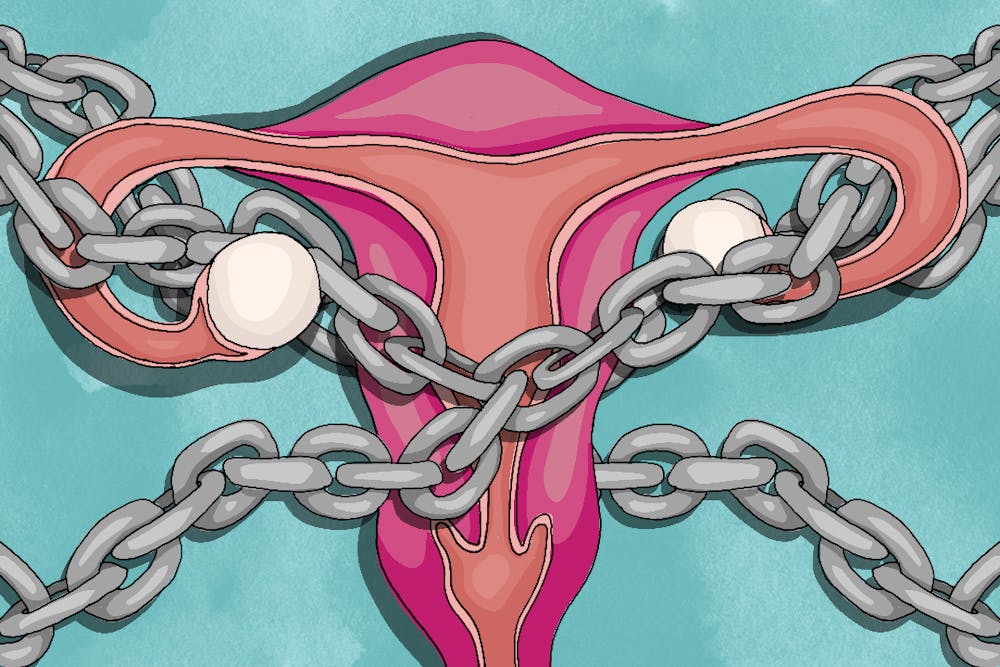Last week's Arizona Supreme Court decision demonstrates that the fight for access to safe abortions cannot be reactionary, and advocates have to be proactive to defend the safety and autonomy of women.
On April 9, the Arizona Supreme Court ruled that an 1864 anti-abortion law could come back into effect. This law, which passed before women had the right to vote in America, would criminalize medical professionals who offer abortions. The sole exception is if the mother's life is at risk.
This law has been on the books for over a century but was kept at bay by the Roe v. Wade Supreme Court decision, which protected abortion access at the national level. When the courts reversed their decision in 2022, the legal battle began in Arizona to bring back the 1864 law.
Roe v. Wade was a monumental success in the fight for access to safe abortions, but overturning that single Supreme Court decision led to a wave of anti-abortion laws. It's easy to understand that with foresight now, but it was a mistake not to codify Roe v. Wade into federal law.
Lexsiri Coronado is a junior at ASU studying English literature and an organizer for the Phoenix branch of the Party for Socialism and Liberation. She is one of many women disappointed in the Democratic party for not enshrining abortion access in federal law.
"In 2022, when the Democrats had the Senate, they had the House, and they also had Joe Biden and the presidency," Coronado said. "They didn't codify Roe v. Wade, they didn't do anything to protect women's rights. They didn't put pressure on the Supreme Court when they could."
The reliance on the Roe v. Wade decision harmed Arizona women, too. The state legislature had passed a law allowing abortions before a 15-week deadline. But, because the 1864 law was still on the books, the Arizona Supreme Court ruled that it should be implemented instead. Rep. Stephanie Stahl Hamilton brought a bill to repeal the law earlier this year, but it did not receive a committee hearing.
Leaving the 1864 law on the books, especially after the Roe v. Wade decision in the 70s, was a massive oversight. It left a future bomb that abortion advocates now have to defuse to protect the health and safety of women.
But this moment can also be a learning opportunity. We have now seen the consequences of protecting abortion with just one ruling and centering laws around that one ruling. Now, there is an opportunity to rebuild abortion access in its most potent form. Here at ASU, there are already students building their ideal future for abortion access.
"Abortion should not be seen differently than ... other aspects of healthcare," Coronado said. "It's all the same. The things that protect us, that intervene in our lives physically and emotionally, we should be able to have access to those things."
As a member of the PSL, Coronado organizes protests, holds educational events and uses social media to spread information and awareness.
For her, this issue is both political and deeply personal.
"I found myself in a situation where I did have to have an abortion because I was in a predatory relationship," Coronado said. "I got pregnant, and I had to have my abortion in isolation."
Coronado explained that experiencing an abortion alone is risky because she had to monitor her blood loss to ensure she was not losing a dangerous amount. A support system could have helped her monitor this while giving her time to rest and recuperate.
When building the future of abortion access, this is something to consider — there can be a preemptive effort to give women support systems if they do experience an abortion. Notably, support systems are far more difficult to maintain when abortion is criminalized, as it often forces women to seek unsafe abortions or procedures in different states.
Right now, the immediate goal should be to restore basic access. In Arizona, this may be by repealing the 1864 law or by voting two Arizona Supreme Court justices out in November. But this is also an opportunity to look further into the future and rebuild a system that avoids the mistakes made previously.
For example, abortion access could be considered part of a more holistic approach to reproductive health practices.
Devils in the Bedroom is a club at ASU that shares resources and information for safer sex practices. A member of their board is Bee O'Callaghan, a junior studying psychology. She explained how abortion and sex education are inherently linked.
"People are saying that people who get abortions are doing it because they're not being responsible whenever they're having sex," O'Callaghan said. "That's not the case. They just don't know sometimes that if (for example) you put a condom in a car, it can deteriorate."
If people are more educated about sex, and especially if the topic is less stigmatized, they can make more informed decisions. Abortion is already an immensely personal and challenging decision; it makes sense that women should be educated and empowered with sex education before even having to consider the choice.
"We should start talking about consent and boundaries when we're toddlers or very young children," said O'Callaghan. "If you can have bodily autonomy right from the get-go, then you can have safer sex practices."
Sex education is still just one piece in a more holistic understanding of abortion access and sexual health. People with uteri often need access to supplies. Luckily, this is where Devils in the Bedroom can be a resource for students on the Tempe and West Valley campuses.
DITB offers Peer-to-Peer Distribution of sexual health supplies, including emergency contraception, menstrual supplies, and condoms for free.
"The (emergency contraception) pack we give is about $100 anywhere else," O'Callaghan said. "The Plan B pill is roughly $30 to $50. We give two because they should not have to worry about it at all."
READ MORE: Devils in the Bedroom destigmatizes sexual education, focuses on creating safe space
PSL and DITB are community groups that are deep in the work to rebuild abortion access as a matter of healthcare and safety. However, they are just a piece of the rebuilding effort. It should be up to everyone who considers themself a supporter of abortion rights to keep pressing forward.
Right now, the exact future of abortion access in Arizona is uncertain. After the decision on April 9, there is a 14-day pause to hear additional arguments. There will be an additional 45-day period before the law can be enforced.
This leaves time for the legislature to repeal the 1864 law. It is also likely that the Arizona for Abortion Access constitutional amendment will be on the ballot in November after it was announced that their petition reached over 500,000 signatures.
In the meantime, there is no shortage of community groups or volunteer opportunities to participate in.
“The fight for every movement goes through ebbs and flows," Coronado said. "The fight for abortion has been in its downturn period, despite Arizona having an almost complete ban on abortion. But the positive side of that is that we can really focus on politically educating and training the people who do and getting them more involved with the larger and broader movement."
We can not become complacent with the sorry state of abortion laws, especially in Arizona. Instead, we should keep envisioning a better future and commit to voting, organizing and supporting abortion access that can not be taken away.
Correction: A previous version of this story misstated Coronado's role with PSL. The story was updated on at 4:26 p.m. on Jan. 13, 2025.
Editor's note: The opinions presented in this column are the author's and do not imply any endorsement from The State Press or its editors.
Want to join the conversation? Send an email to editor.statepress@gmail.com. Keep letters under 500 words, and include your university affiliation. Anonymity will not be granted.
Edited by Walker Smith, Sadie Buggle and Caera Learmonth.
Reach the reporter at syramir2@asu.edu and follow @nerdyoso on X.
Like The State Press on Facebook and follow @statepress on X.
Sophia is a senior studying biological sciences. This is her fifth semester with The State Press. She has also worked as a science and technology reporter.




